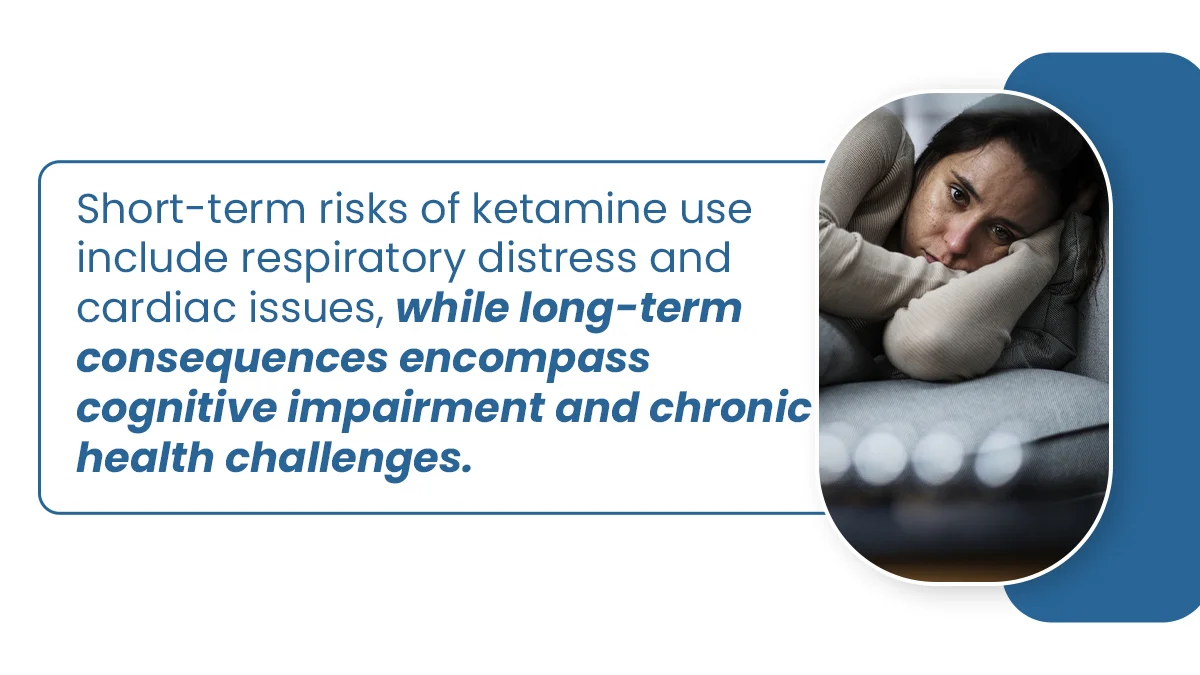Awareness to Action: Ketamine Overdose Symptoms
Ketamine, a dissociative anesthetic used in medical settings, can lead to overdose with severe consequences. Identifying the signs of a ketamine overdose is vital for anyone who may encounter individuals exposed to this substance. From altered consciousness to respiratory distress, learn the symptoms essential for prompt intervention and medical assistance.
This brief guide aims to provide a complete overview of ketamine overdose indicators. Stay informed about these signs to promote a safer environment and contribute to a healthier society.
Key Takeaways
Ketamine, used in medical settings, can lead to overdose with painful outcomes. Here’s what you need to know:
- Identifying physical and psychological symptoms of ketamine overdose is crucial for swift intervention, reducing the risk of severe health consequences.
- Short-term risks include respiratory distress and cardiac issues, while long-term consequences encompass cognitive impairment and chronic health challenges.
- Immediate medical attention is paramount in addressing ketamine overdose.
The Haven Detox-New Jersey offers personalized support for individuals seeking approaches to substance abuse recovery. Contact us at (856) 565-3102 to explore our beneficial services.

What Is Ketamine Overdose
A ketamine overdose occurs when someone takes too much of the drug, leading to severe health risks. Symptoms include confusion, hallucinations, and difficulty breathing. In intense cases, it can lead to seizures or coma.
Ketamine is commonly used as a veterinary anesthetic but is misused for its hallucinogenic effects. Overdose risk is higher when combined with other substances.
In the United States, ketamine misuse has become a concern, impacting physical and mental well-being. If you or someone shows signs of overdose, seek immediate medical help to take a proactive step for yourself and others.
Recreational Use and Overdose Risk
Ketamine, used recreationally for its hallucinogenic effects, poses overdose risks. In the United States, misuse is concerning, impacting physical and mental health.
In addition to information, combining ketamine with other substances increases the danger. Signs of overdose include confusion, hallucinations, breathing difficulties, seizures, or coma.
Immediate medical help is crucial if overdose symptoms (much ketamine) appear. Ketamine, primarily a veterinary anesthetic, is abused for its mind-altering properties. Stay informed, avoid misuse, and seek assistance to prevent severe consequences.
Identifying Ketamine Overdose Symptoms
Ketamine overdose symptoms manifest in physical and psychological ways. Learn to identify these indicators and ensure prompt medical assistance.
Physical Symptoms
Identifying physical symptoms is crucial in determining a ketamine overdose.
- Slowed Breathing: Ketamine overdose can cause a dangerous decrease in breathing rate.
- Increased Heart Rate: The heart may beat faster than usual, leading to cardiovascular stress.
- Elevated Blood Pressure: Ketamine overdose can result in high blood pressure, posing risks to heart health.
- Muscle Rigidity: Overdosing on ketamine may cause muscles to become excessively tense and rigid.
Observing these signs can prompt swift intervention, potentially preventing further complications.
Psychological Symptoms
Ketamine overdose manifests psychologically involves:
- Confusion: Ketamine overdose may lead to mental disorientation and difficulty understanding surroundings.
- Hallucinations: Overdosing on ketamine can cause individuals to see or hear things that are not present.
- Dissociation: A sense of detachment from reality is a common psychological symptom of ketamine overdose.
If someone exhibits these signs after ketamine use, seek immediate medical help to address the psychological impact and ensure the person’s well-being.
Health Risks Associated With Ketamine Overdose
Ketamine overdose poses immediate and long-term health risks. These implications underscore the urgency of addressing ketamine overdose promptly.
Short-Term Health Implications: Short-term consequences of ketamine overdose include respiratory distress, cardiac issues, and potential accidents due to impaired coordination. Immediate medical attention is integral to addressing these acute health risks.
Long-Term Health Implications: Prolonged ketamine use and repeated overdose incidents can lead to chronic health issues. These may involve cognitive impairment, kidney dysfunction, and mental health challenges. Identifying the long-term risks emphasizes the importance of preventing and addressing ketamine overdose promptly.
Science Behind Ketamine Overdose
The science behind ketamine overdose lies in its impact on specific brain receptors, resulting in dissociative and anesthetic effects. Learn this intricate process to comprehend the severity of ketamine overdose.
How Ketamine Affects the Brain: Ketamine blocks specific receptors in the brain, resulting in dissociative and anesthetic effects. Overdose occurs when these effects become excessive, causing a range of physiological and psychological disruptions. Learning this process is fundamental in comprehending the severity of ketamine overdose.
The Role of Tolerance in Overdose: As individuals develop tolerance to ketamine, they may require higher doses to achieve the desired effects. This tolerance escalation increases the risk of inadvertently crossing into overdose territory. Monitoring and managing tolerance levels can help mitigate this danger.
Treatment of Ketamine Overdose
When addressing ketamine overdose, immediate medical attention is paramount.
In a healthcare setting, treatment may include drug administration, detoxification, and therapy. Given its origin in veterinary medicine, ketamine has therapeutic uses, but it’s recreational use poses a greater risk, leading to toxic buildup and adverse effects. In instances of ketamine abuse or chronic misuse, detox programs, both inpatient and outpatient, are available.
Researchers study the drug’s impact on mental health conditions, stressing the importance of tailored therapy. Clear signs of ketamine overdose necessitate intervention, highlighting the best way to address its effects today.
Emergency Steps for Overdose
In the event of a ketamine overdose, swift action is vital to tailor individual needs. Call emergency services at 911 immediately. Emergency responders are equipped to administer appropriate medical interventions.
The effects of ketamine, acting on the glutamate receptor, can result in severe mental health conditions. Realizing this, researchers continually study ketamine’s impact on refining treatment approaches.
Whether detoxification in an inpatient facility or outpatient therapy, tailored intervention is crucial to mitigate the risks. Today, addressing ketamine overdose involves a multifaceted strategy, acknowledging the risks associated with its misuse and the importance of seeking timely medical assistance.

 (856) 565-3102
(856) 565-3102
